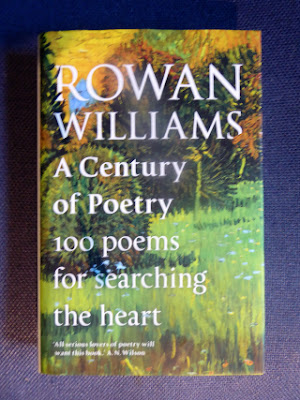An anthology of 100 poems written in the past 100 years, with readerly responses on each from Rowan Williams, is a kind of autobiography of the archbishop’s roving mind. Titled ‘A Century of Poetry’, the book’s subtitle gets to the point with the claim that we are “searching the heart.” This is not a best-of or my-favourites collection, but one where poems “open the door to some fresh, searching, and challenging insights about the life of faith.”
The English poet Michael
Symmons Roberts opens ‘A New Song’:
Sing a new song to the Lord,
sing through the skin of your
teeth,
sing in the code of your blood,
sing with a throat full of earth
To which Rowan asks, why do we
praise? Then answers, “praise is as inescapable as lament in the human world.
The singing evoked here is not a full-throated self-indulgent performance; it
is what manages to escape from choked and knotted insides because it can’t be
contained; and it names or at least points towards what can’t be named.” His
readings, over and again, are interested in the contradictions in our
inheritance, how questions keep rising up that must be asked and considered.
Roberts concludes
sing what you never could say,
sing at the fulcrum of joy,
sing without need of reply.
Rowan Williams is a maker of
poetry and this is a guidebook to the sorts of poems he would perhaps like to
make himself; we detect many of his own poetic interests and stylistic
tendencies in this admiring selection. For example, the Pakistani-Scots poet
Imtiaz Dharker’s poem ‘Prayer’ is not a world away from Rowan’s own manner:
The place is full of
worshippers.
you can tell by the sandals
piled outside, the owners’
prints
worn into leather, rubber, plastic,
a picture clearer than their
faces
put together, with some originality,
brows and eyes, the slant
of cheek to chin.
“What prayer are they whispering?” she asks. Rowan writes, “the worn sandal as ‘the perfect pattern of a need’ is the central image of the poem, Each of the sandals left at the door of the mosque has a unique set of indentations, a unique history of being pushed into this distinct shape by the unavoidable daily pressure of keeping moving.” Each sentence of his reading extends the meanings and ambiguities of Dharkar’s poem into a satisfying reflection on her own more concise argument. One example: “Dharkar … gives us an austerely compelling picture of what prayer actually is: it is something as inescapable as walking, something that has to do not with anxious petitioning or ecstatic thanksgiving but with the sheer hope of moving, or perhaps growing, into a future.”
Understandably, Welsh poets are well-represented.
Gwyneth Lewis, in ‘How to Read Angels’, writes of the encounter:
Yes, information, but that’s
never all,
there’s some service, a message.
A lie dispelled,
something forgiven, an alternative
world
glimpsed, for a moment, what you
wanted to hear
but never thought possible. You
feel a fool
but do something anyway …
Rowan identifies some rules of
thumb about angel voices: “Truthfulness, forgiveness, hope – these are reliable
signs that whatever has been sensed or guessed at is more than just the
contents of our own mind … What is convincing is the surprise that something we
wanted might after all be thinkable.” Discovering what might be thinkable is a
hallmark of this book.
The Indian novelist Vikram Seth
took up residence in the Old Rectory at Bemerton, outside Salisbury, the home
of poet George Herbert for a brief time in the seventeeth century. Rowan says Seth’s
background is Hindu, but in this context it’s true to say his background is
also decidedly Christian. His list poem called ‘This’ includes the following
items:
A beast of light; a blaze to
quench or stoke;
Bread burst and burnt; sweet wind-fall;
storm-cloud-milk;
Hope raised and razed; skin-ploy; sleep-foil;
steel-silk …
Seth once wrote a novel
composed entirely in Pushkin sonnets, so he is right at home here writing a
sonnet about love (the answer to the riddle) emulating Herbert’s about prayer. “Like
all good metaphorical speech, the succession of images sets out the
contradictions that push us into poetry,” writes Rowan, saying that Seth’s poems
“prompt some lingering on the frontier of ‘sacred’ and ‘profane’ experience,
some questioning about how porous those boundaries are.” This porousness is
something Rowan Williams explores again and again in this book, just as he does
in so much of his writing, and poetry. Poetry’s appeal to experience opens up
our shared knowledge, something being foregrounded here all the time.
Australian Les Murray’s oft-quoted
‘Poetry and Religion’ goes
Religions are poems. They concert
our daylight and dreaming mind,
our
emotions, instinct, breath and
native gesture
into
the only whole thinking: poetry.
Rowan
applauds Murray’s avoidance of cliché, chiming in with his shared view that “poetry
aims to do in a small space what religion does in a large, communal and
historically extended space: to hold a mirror to a formidable range of
shifting, threatening, exhilarating ‘givens’ that require us to adjust to their
presence and make sense of them.” This is another way of meeting and enjoying
the many ideas and experiences offered here. I have briefly quoted just five poems
that are part of an ongoing conversation Rowan Williams generates in this book.
The invitation is there to pick up a line, a verse and see where it takes you.

Comments
Post a Comment